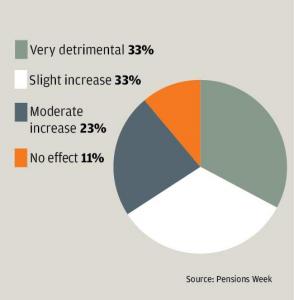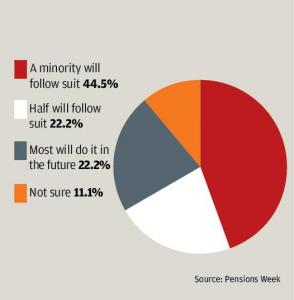DC 30: auto-enrolment, opt-out and corporate ISAs
Q1. The National Employment Savings Trust’s (Nest) telephone opt-outs have been given the green light and its competitors are expected to start offering them as a result. How detrimental, if at all, will this be to opt-out figures?
Responses were mixed and there was no clear consensus. One third fear it will be very detrimental, while another third said it would only slightly increase numbers. 11.1% don’t believe it will affect opt-out rates at all, while 22% said it would result in a moderate increase in opt-outs.
Some respondents said they were disappointed with Nest. One said: “The original requirements were meant to avoid opting out being a simple box-ticking exercise.
Nest’s procedure has undermined this but, because it’s attractive to employers, its competitors have no option but to follow suit to be competitive. It’s a real pity because Nest has done some excellent work in setting high industry standards.”
And others said it makes sense to add this facility, but acknowledged it will inevitably make it easier for decliners to “get their own way”.
But another group of respondents welcomed the move. One said: “It’s sensible to give members a choice of channels.”
One encouraging thought many respondents shared was that inertia will prevail over the ease of telephone opt-out. One said: “It’s easier to opt out than by form, therefore reasonable to expect an increase in opt-outs, however would still expect inertia to dominate.”
Another said: “The majority of people who would opt out are likely to be proactive. Therefore they will likely already be opting out by some other means.”
Q2. Standard Chartered has been named as the first FTSE 100 company to offer ISA contributions as part of a corporate wrap. What proportion of UK plc do you think will follow suit?
The largest group (44.4%) said a minority will follow in the footsteps of Standard Chartered’s workplace savings solution – a move
that young staff in particular have welcomed.
But a further 22.2% estimate around half will set up corporate wraps with ISA contributions, while an optimistic 22.2% believe most will do it in the future. A further 11.1% weren’t sure.
Some were sceptical of ISA contributions because members don’t benefit tax efficiently from employer contributions, unlike with pensions.
But others questioned the long-term future of pensions tax relief. One said: “If pensions become more attractive, employers might become more creative in their ‘retirement reward’.
Also, if the mortgage market remains difficult, this, with increasing pressure from student debt, may see graduate packages move away from pension only.”
Others said pensions have a poor brand image, and highlighted the fact people seem to engage with, understand and like ISAs.
One said: “More money now goes into ISAs than workplace pensions. Smart employers will recognise this and offer their staff something they will appreciate alongside a traditional pension arrangement.”
However one less-convinced respondent questioned the need for a savings option other than pensions because ISAs are easily available in the retail market.
Q3. Is the fact the government will review the costs of auto-enrolment a sign that further concessions should be made to business in relation to the reform?
More than half (55.6%) weren’t sure, while 22.2% said yes and the same number said no. While there was little consensus about whether concessions should be made to businesses, many agreed the government should be firm.
One said: “Of course, the economy is fragile and businesses (particularly smaller ones) need support; but this is a once-in-a-generation chance to do the right thing and set up a sustainable long-term solution to the retirement challenge. We shouldn’t lose it.”
Others highlighted the need for speed. “We need to move ahead and implement as quickly as possible and not start introducing concessions. No more concessions; we need to be planning on increasing contributions to around 16%,” said one.
But a few were concerned about the practicalities of handling this at the smaller-business level. One warned: “This represents a major challenge – and best to avoid a debacle by whatever means it takes.”
Most Viewed
- LGPS latest: GLIL backers invest £475m for UK infrastructure push
- What does Labour have in store for the pensions industry?
- Dashboard costs rose by 23% in 2023, figures show
- Border to Coast launches UK strategy in major private markets push
- How the pensions industry can better support people with mental health problems



